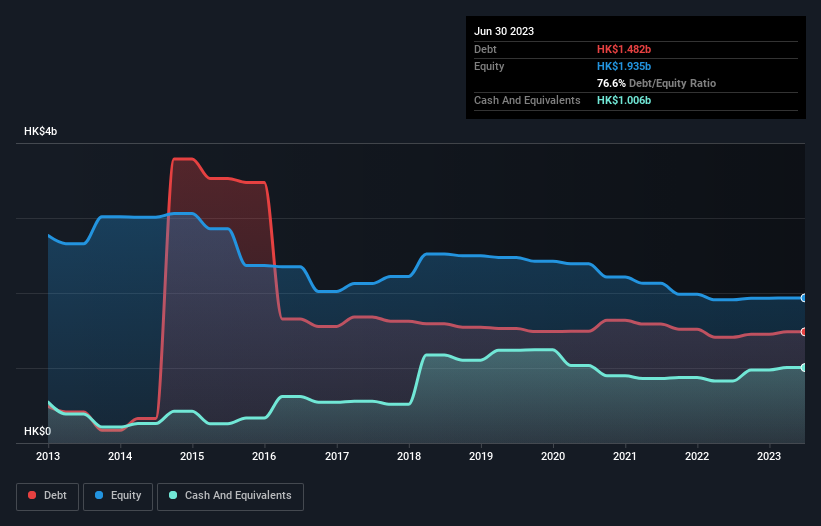The external fund manager backed by Berkshire Hathaway's Charlie Munger, Li Lu, makes no bones about it when he says 'The biggest investment risk is not the volatility of prices, but whether you will suffer a permanent loss of capital.' It's only natural to consider a company's balance sheet when you examine how risky it is, since debt is often involved when a business collapses. Importantly, Kai Yuan Holdings Limited (HKG:1215) does carry debt. But is this debt a concern to shareholders?
When Is Debt A Problem?
Generally speaking, debt only becomes a real problem when a company can't easily pay it off, either by raising capital or with its own cash flow. Ultimately, if the company can't fulfill its legal obligations to repay debt, shareholders could walk away with nothing. However, a more frequent (but still costly) occurrence is where a company must issue shares at bargain-basement prices, permanently diluting shareholders, just to shore up its balance sheet. Of course, the upside of debt is that it often represents cheap capital, especially when it replaces dilution in a company with the ability to reinvest at high rates of return. The first thing to do when considering how much debt a business uses is to look at its cash and debt together.
View our latest analysis for Kai Yuan Holdings
What Is Kai Yuan Holdings's Net Debt?
You can click the graphic below for the historical numbers, but it shows that as of June 2023 Kai Yuan Holdings had HK$1.48b of debt, an increase on HK$1.41b, over one year. However, because it has a cash reserve of HK$1.01b, its net debt is less, at about HK$476.5m.

How Strong Is Kai Yuan Holdings' Balance Sheet?
According to the last reported balance sheet, Kai Yuan Holdings had liabilities of HK$104.6m due within 12 months, and liabilities of HK$1.63b due beyond 12 months. On the other hand, it had cash of HK$1.01b and HK$129.5m worth of receivables due within a year. So its liabilities outweigh the sum of its cash and (near-term) receivables by HK$596.2m.
This deficit casts a shadow over the HK$204.5m company, like a colossus towering over mere mortals. So we'd watch its balance sheet closely, without a doubt. After all, Kai Yuan Holdings would likely require a major re-capitalisation if it had to pay its creditors today.
In order to size up a company's debt relative to its earnings, we calculate its net debt divided by its earnings before interest, tax, depreciation, and amortization (EBITDA) and its earnings before interest and tax (EBIT) divided by its interest expense (its interest cover). Thus we consider debt relative to earnings both with and without depreciation and amortization expenses.
Weak interest cover of 0.43 times and a disturbingly high net debt to EBITDA ratio of 9.2 hit our confidence in Kai Yuan Holdings like a one-two punch to the gut. This means we'd consider it to have a heavy debt load. One redeeming factor for Kai Yuan Holdings is that it turned last year's EBIT loss into a gain of HK$11m, over the last twelve months. There's no doubt that we learn most about debt from the balance sheet. But it is Kai Yuan Holdings's earnings that will influence how the balance sheet holds up in the future. So when considering debt, it's definitely worth looking at the earnings trend. Click here for an interactive snapshot.
But our final consideration is also important, because a company cannot pay debt with paper profits; it needs cold hard cash. So it is important to check how much of its earnings before interest and tax (EBIT) converts to actual free cash flow. Over the last year, Kai Yuan Holdings actually produced more free cash flow than EBIT. That sort of strong cash conversion gets us as excited as the crowd when the beat drops at a Daft Punk concert.
Our View
To be frank both Kai Yuan Holdings's interest cover and its track record of staying on top of its total liabilities make us rather uncomfortable with its debt levels. But at least it's pretty decent at converting EBIT to free cash flow; that's encouraging. Overall, it seems to us that Kai Yuan Holdings's balance sheet is really quite a risk to the business. For this reason we're pretty cautious about the stock, and we think shareholders should keep a close eye on its liquidity. There's no doubt that we learn most about debt from the balance sheet. However, not all investment risk resides within the balance sheet - far from it. For example Kai Yuan Holdings has 3 warning signs (and 1 which can't be ignored) we think you should know about.
If you're interested in investing in businesses that can grow profits without the burden of debt, then check out this free list of growing businesses that have net cash on the balance sheet.
Valuation is complex, but we're here to simplify it.
Discover if Kai Yuan Holdings might be undervalued or overvalued with our detailed analysis, featuring fair value estimates, potential risks, dividends, insider trades, and its financial condition.
Access Free AnalysisHave feedback on this article? Concerned about the content? Get in touch with us directly. Alternatively, email editorial-team (at) simplywallst.com.
This article by Simply Wall St is general in nature. We provide commentary based on historical data and analyst forecasts only using an unbiased methodology and our articles are not intended to be financial advice. It does not constitute a recommendation to buy or sell any stock, and does not take account of your objectives, or your financial situation. We aim to bring you long-term focused analysis driven by fundamental data. Note that our analysis may not factor in the latest price-sensitive company announcements or qualitative material. Simply Wall St has no position in any stocks mentioned.
About SEHK:1215
Kai Yuan Holdings
An investment holding company, owns and operates hotels in Hong Kong and France.
Slightly overvalued with imperfect balance sheet.
Market Insights
Weekly Picks

THE KINGDOM OF BROWN GOODS: WHY MGPI IS BEING CRUSHED BY INVENTORY & PRIMED FOR RESURRECTION


Why Vertical Aerospace (NYSE: EVTL) is Worth Possibly Over 13x its Current Price


The Quiet Giant That Became AI’s Power Grid
Recently Updated Narratives


Mastersystem Infotama will achieve 18.9% revenue growth as fair value hits IDR1,650


Insiders Sell, Investors Watch: What’s Going On at PG?

Waiting for the Inevitable
Popular Narratives


MicroVision will explode future revenue by 380.37% with a vision towards success


NVDA: Expanding AI Demand Will Drive Major Data Center Investments Through 2026


Crazy Undervalued 42 Baggers Silver Play (Active & Running Mine)
Trending Discussion




